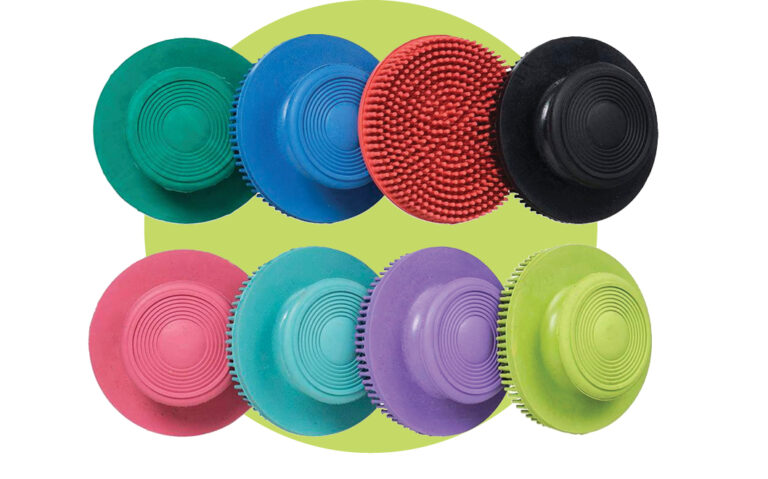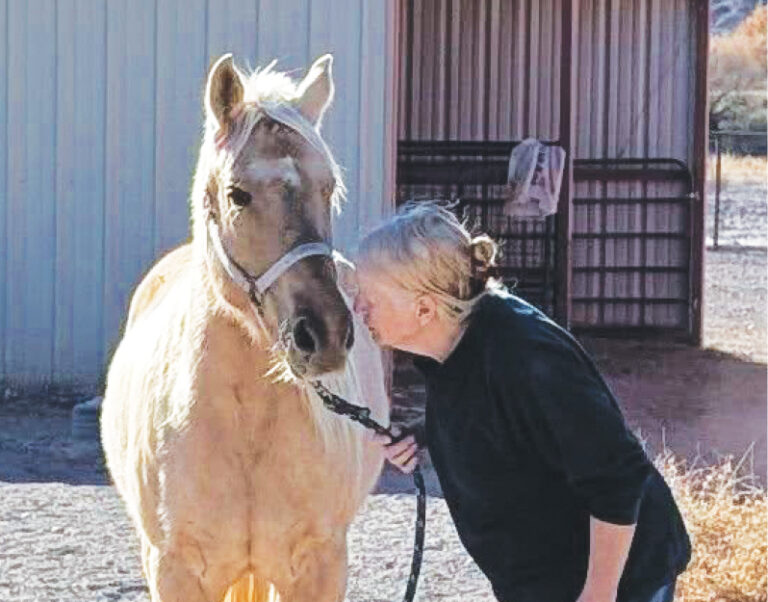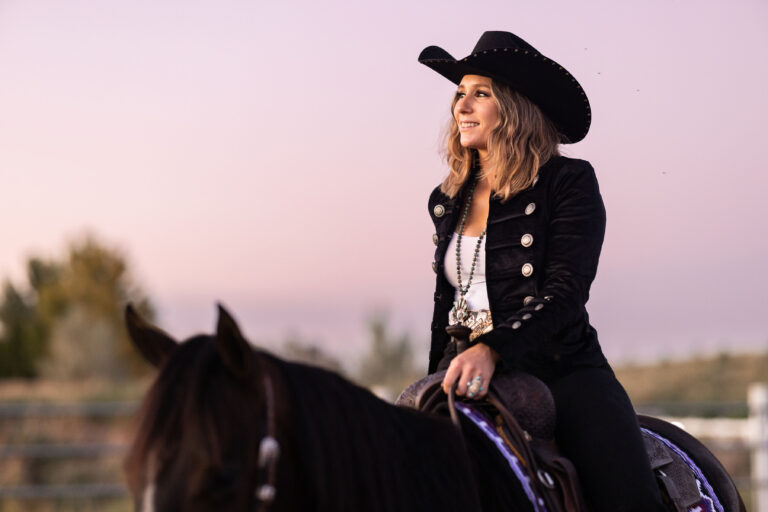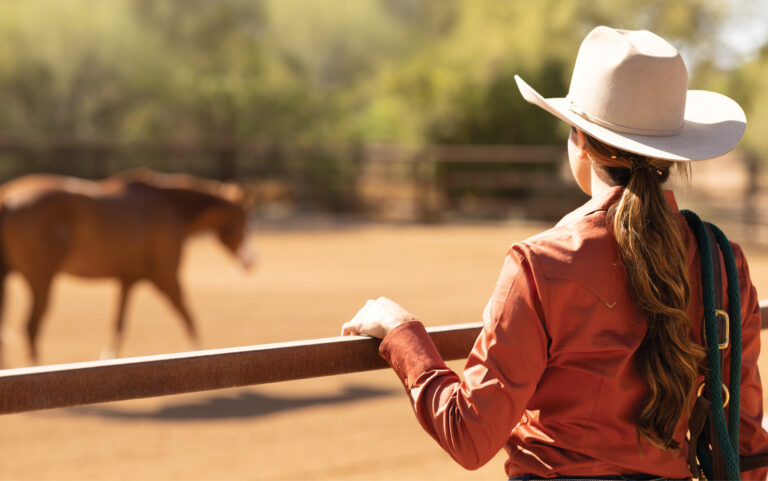Burly black cows protest noisily in the crowded sorting pen as cowboy Kelly Bess rides up to peer at them. Bare oak trees are silhouetted against a clear blue sky on a Northern California day made for ranchers—sunny and mild. “When calves bloom and the grass just grows,” Bess says, smiling appreciatively.
Looking at this handsome cowboy, in his starched blue Wranglers and well-shaped hat, sitting easily atop his roan Quarter Horse, you can tell straight away he’s an accomplished horseman. What you wouldn’t suspect—unless you’d seen his wife, Susan, helping him mount—is that he spends his off-horse time in a wheelchair, the result of an automobile accident in 1981. Perhaps it’s the cowboy’s glass-half-full mentality that makes his physical condition—paralysis from his midsection down—one of the lesser-important things about him.
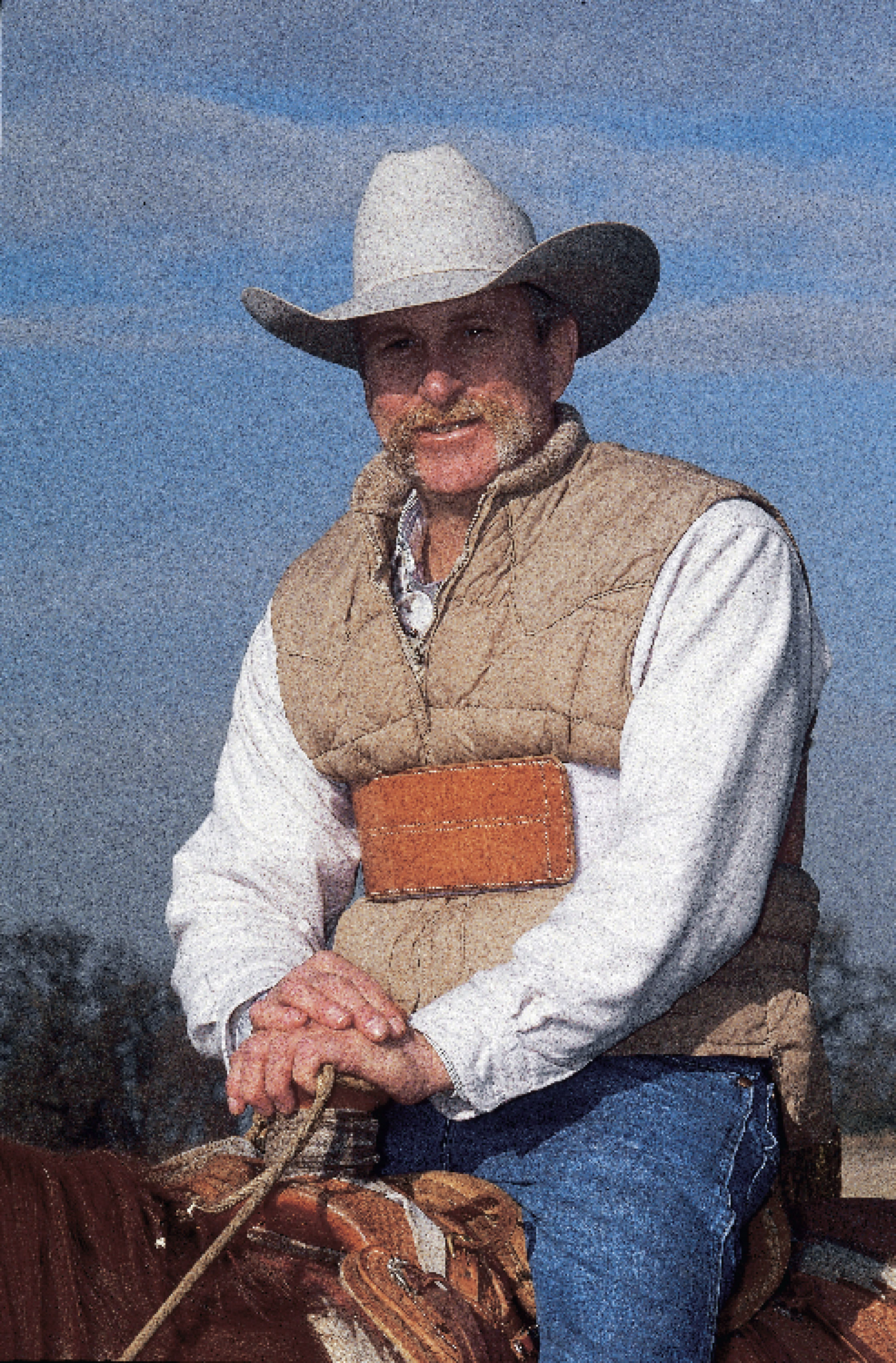
“I never get too down,” he says, thoughtfully. “There’s always someone who’s in a worse condition than you, and you have to look at the positive side of life. Besides,” he adds with a wry grin, “it sure doesn’t help to sit and dwell on things.”
Sitting and dwelling is something this good-natured horseman just doesn’t do. That’s fortunate, because chores on his 120-acre cattle ranch in Lincoln, California (about 30 miles north of Sacramento), are never-ending. Moreover, when he’s not busy at home, you’ll find him running the Murieta Equine Complex, a world-class equestrian facility just southeast of Sacramento. As MEC’s vice president and general manager for the past 17 years, Bess, 42, oversees some of the most popular horse events in Northern California, including the West Coast Equine Foundation Spectacular Reining, which routinely draws some of the best reining talent in the nation.
Right now, however, he’s busy with a typical Saturday ranch chore: sorting a dozen cows and calves out of a herd of about 200, and moving them to another pasture. He’s assisted this morning by his wife of 16 years, and their daughters, Kaitlin, 15, and Kassi, 10. The herd consists of about 100 pairs of mostly Black Angus cows and calves, along with a few creamy-white Charolais bulls. In addition to Bess’s spread, the cattle run on an additional 1,000-plus acres of leased land.
The sorting pen comes alive as Bess and his oldest daughter ride their horses deep into the herd. Susan trudges through the mud to work the green panel gate, while Kassi takes her position on the fence and assists her mother as necessary.
Bess speaks softly as he coaches Kaitlin on how to position her horse to contain a white-faced cow that’s balking at the gate. A few whistles and clucks later, the reluctant cow joins her calf in the holding pen.
Later, Bess reflects on the nature of ranching—an existence that to him means accepting challenges and working hard while keeping family and friends close at hand. “It’s the lifestyle I’ve always wanted for myself and my family,” he says. “It’s a great atmosphere for the kids to grow up in. They know the meaning of work and overcoming obstacles. And they know how to do a good job—how to excel.”
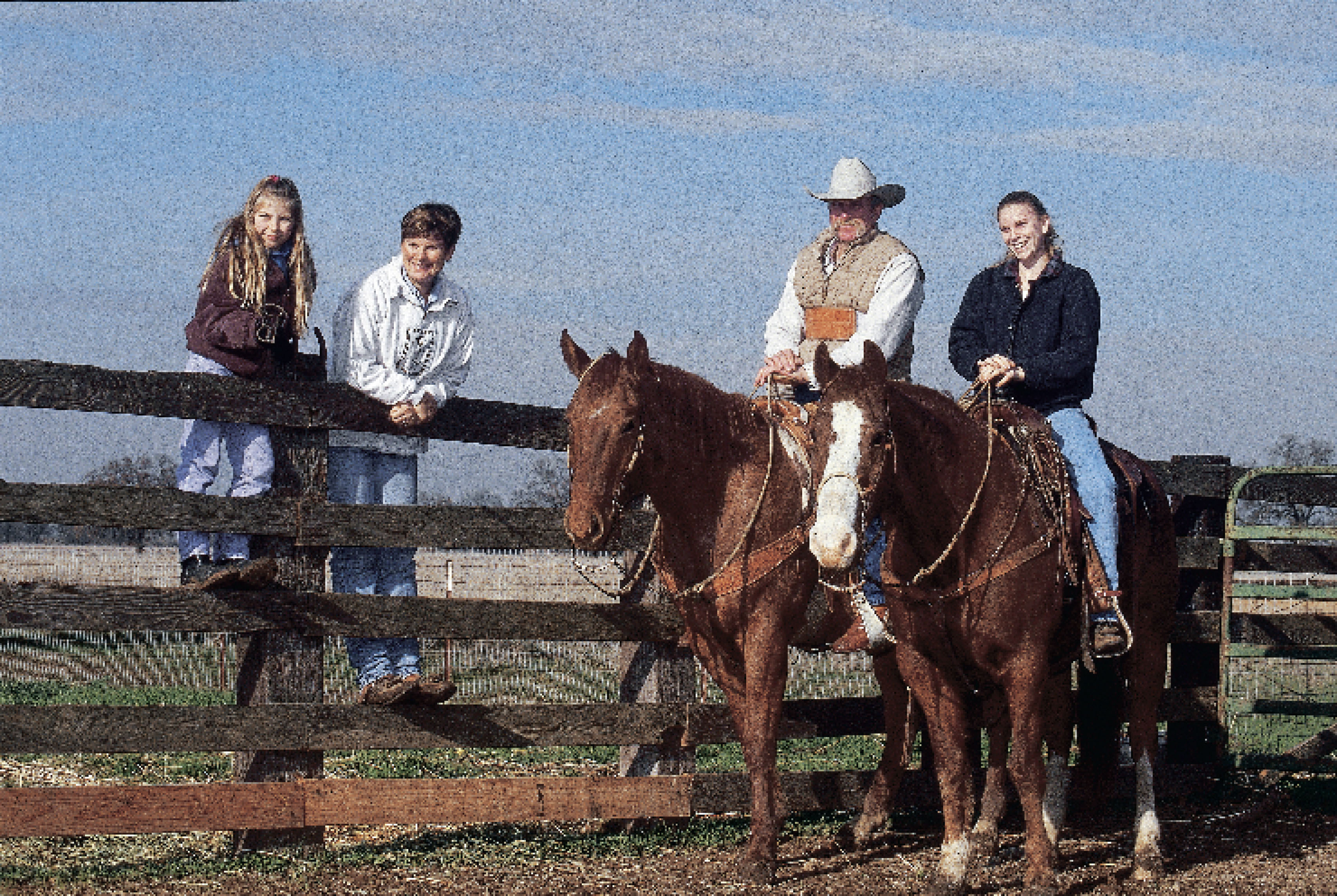
Living His Philosophy
Born and raised in the house where he and his family now live, Bess has maintained his own determination to excel despite the incident that changed his life, just days before his 19th birthday. He’d been playing in a weekend-long basketball tournament, and fell asleep at the wheel just four miles from home. Because he wasn’t wearing a seatbelt, he was ejected from the truck when it rolled; a blood clot on his spinal cord caused his paraplegia.
“Back then, information about spinal-cord injuries was limited,” he says, adding that his positive outlook actually caused him to refuse therapy. “When I got out of my body jacket in three months, the doctors told me I’d never wear Wranglers or ride a horse again. So instead of following their therapy program, I made my own.”
Bess started by finding a saddle-maker to craft a saddle with a “chair back” feature that straps around his chest to stabilize him. The tree is designed to withstand the pressure his immobile lower torso puts on it, and a high-tech foam pad buckles onto the saddle’s seat to reduce the pressure on his hips and tailbone.
“Without that, I couldn’t ride, period,” says Bess emphatically. Now, he not only rides, but also ropes competitively in three or four ranchers’ day contests each year—and wears a championship belt buckle to prove it.
Not the least bit uncomfortable about recalling his accident and its aftermath, Bess is quick to help others in similar situations, and the example he sets can be inspirational. One young woman, a former assistant to a local trainer, hadn’t ridden in years after breaking her back in an automobile accident.
“She came out to the ranch and we put her on a horse, using my equipment,” Bess recalls. “She was scared, but riding again had been a dream of hers, and you could see from the expression on her face what a thrill it was to be getting back on a horse.”
After succeeding with his own therapy program, Bess went on to college, graduating with a bachelor’s degree in business administration from California State University, Sacramento. That put him in a good position to go after—and nail—the managerial position at MEC in 1986.
The one-way commute time from his home to Rancho Murieta, where the facility is located, is about an hour; Bess rises at 4 a.m. every workday to arrive at his job on time. Normally he puts in a 40-hour week, but during the busy summer show season he’s often there seven days a week. When that happens, Susan takes on more of the ranch chores, such as adjusting the pasture irrigation that runs 24 hours a day, seven days a week, during the Sacramento Valley’s sweltering summer months.
Susan met her future husband in 1988 at a local calf branding while visiting from her hometown in Oregon. “Kelly was very nice and even loaned me a horse to rope on,” she recalls. “Not just everybody does that.” The two connected “on a deeper level,” says Susan, who adds that she barely noticed his disability. “He’s overcome it, really. In the true sense, there is no disability.”
Life with Kelly today “is never boring,” she says. “Sometimes he drives me crazy because he’s such a perfectionist, but without that drive he wouldn’t be who he is. He’s also a workaholic. I’d love it if he could slow down.” That, however, seems unlikely. “It drives me nuts to sit still,” says Bess.
Running the Show
His nonstop work ethic has served him well at the 120-acre MEC, where his first challenge was to expand the horse-show facilities. Before he signed on, the complex consisted of an indoor arena, a couple of outdoor arenas, a hotwalker, and a 40-stall barn. Today, there are some 500 stalls, with access to more as needed. An additional 60,000-square-foot building houses a second indoor arena that seats 3,500. Multiple outdoor arenas and a spacious cross-country jump course attract three-day eventers and Pony Club enthusiasts.
Bringing in new events was another top priority. “We wanted to put MEC on the map as a premier horse-show facility,” says Bess, whose first move was to “pick up the phone and start calling.” His aggressive approach, plus a customer-service mindset, not only brought in new events, but also kept others coming back. As a result, this year “should be our busiest yet,” he says.
Among the more than 35 events already scheduled for 2004 include major breed shows for Quarter Horses, Paints, Appaloosas, and Arabians, as well as popular open events, such as the Gold-N-Grand All Breeds Horse Show. In addition to the WCEF Spectacular and other popular reinings, there’ll be cutting, roping, and rodeo events.
For English riders, MEC’s calendar includes horse trials, dressage shows, hunter-jumper events, and Pony Club rallies. Rounding out the equestrian offerings are the State 4-H Classic Horse Show and the AHA Sport Horse Championships.
Bess points with pride to MEC’s attractions, including good footing, ample RV parking, full cattle-handling capability, and a central location with good highway access. He also praises the complex’s many dedicated, longtime employees, while MEC owner and president Carol Anderson points to Bess himself as the source of high morale.
“You can’t have a bad day if you come in and say a few words to Kelly,” notes Anderson. “He’s always positive and always looking for a better way of doing things. He’s remarkable that way.”
In the face of such praise, Bess just shrugs, crediting good parenting and high-school sports. “I’ve never liked being second best,” he says, simply. “You’ve got to take whatever situation you find yourself in, turn it around, and make the best of it. Ride out the peaks and valleys.”
He reins his gelding, Roanie, away from the sorting pens. The herd settles down as calves find their mothers. Roanie, a 15.2-hand descendent of King Fritz, is a mellow fellow. “Too gentle,” Bess remarks of the 7-year-old. He says he’d like something a little less laid back, a bit quicker, more aggressive. A horse that, like its owner, would be up to any challenge.”
MORE INSPIRATION

